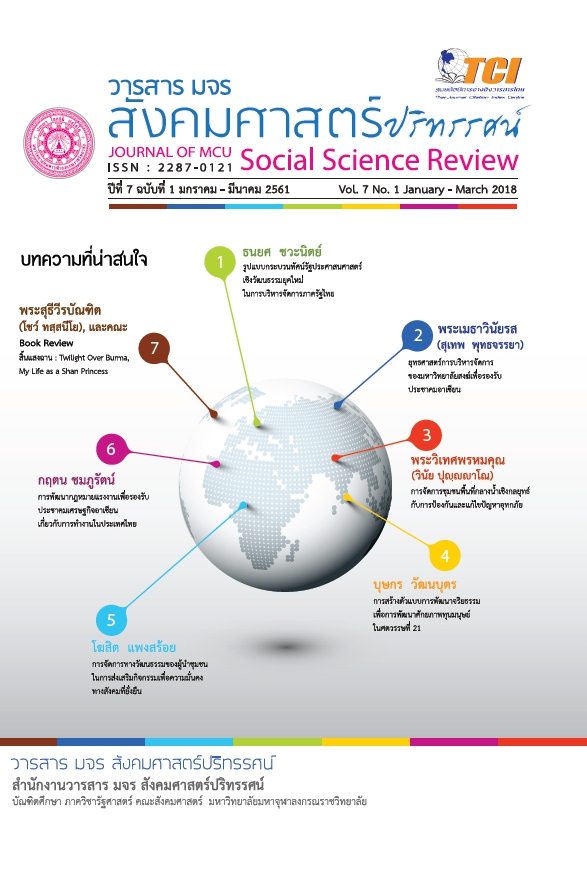ปัจจัยที่มีอิทธิพลต่อความสามารถในการจัดการทุนมนุษย์: การสำรวจเชิงประจักษ์จากธุรกิจโรงแรมในประเทศไทย
คำสำคัญ:
ความสามารถในการจัดการ, ทุนมนุษย์, ธุรกิจโรงแรมบทคัดย่อ
ปัจจัยที่มีอิทธิพลต่อความสามารถในการจัดการทุนมนุษย์: การสำรวจเชิงประจักษ์จากธุรกิจโรงแรมในประเทศไทย มีวัตถุประสงค์ของการวิจัยเพื่อศึกษาความสัมพันธ์ระหว่างการมุ่งเน้นภาวะผู้นำการเปลี่ยนแปลง กลยุทธ์เชิงรุกขององค์กร ความสามารถปฏิบัติการทางด้านทรัพยากรมนุษย์และความไม่แน่นอนด้านสิ่งแวดล้อมแบบไดนามิกมีผลกระทบต่อความสามารถในการจัดการทุนมนุษย์ กลุ่มตัวอย่างเก็บรวบรวมจำนวน 344 ชุด จากกรรมการผู้จัดการหรือหุ้นส่วนผู้จัดการของธุรกิจโรงแรมในประเทศไทย แบบสอบถามถูกนำมาใช้เป็นเครื่องมือในการเก็บรวบรวมข้อมูล สถิติที่ใช้ในการวิเคราะห์ข้อมูลคือการวิเคราะห์ความสัมพันธ์และการวิเคราะห์การถดถอยแบบ (OLS) ผลการวิจัยแสดงให้เห็นว่า ความสามารถปฏิบัติการทางด้านทรัพยากรมนุษย์ การมุ่งเน้นภาวะผู้นำการเปลี่ยนแปลง ความไม่แน่นอนด้านสิ่งแวดล้อมแบบไดนามิก และกลยุทธ์เชิงรุกขององค์กร มีอิทธิพลในเชิงบวกอย่างมีนัยสำคัญเกี่ยวกับความสามารถในการจัดการทุนมนุษย์ ข้อเสนอแนะสำหรับการวิจัยในอนาคตอาจจะมีการศึกษาเพื่อเป็นการเปรียบเทียบผลการวิจัยเพิ่มเติม
เอกสารอ้างอิง
Andre, & Lantu, C.D. (2015). Servant Leadership and Human Capital Management: Case study in Citibank Indonesia. Social and Behavioral Sciences. 169, 303-311.
Aulakh, P. S., Masaaki. K. & T. Hildy. (2000). Export Strategies and Performance of Firm from Emerging Economies: Evidence from Brazil, Chile, and Mexico. Academy of Management Journal. 43(3), 342-361.
Bass, B. M. & Avolio, B. J. (1989). Potential biases in Leadership Measures: How Prototypes, Leniency, and General satisfaction Relate to ratings and rankings of Transformational and Transactional Leadership Constructs. Educational and Psychological Measurement. 49(3), 509-552.
Becker, B. E. & Huselid, M. A. (2000). Getting an Edge Through People. Human Resource Management International Digest. 8(3), 36-38.
Becker, G.S. (1965). Human Capital. University of Chicagbo Press. Chicago IL.
Benevene, P. & Cortini, M. (2010). Human Resource Strategic Management in Npos an Explorative Study on Managers’ Psychosocial Training. Journal of Workplace Learning. 22(8), 508-521.
Boselie, P., Dietz, G. & Boon, C. (2005). Commonalities and Contradictions in HRM and Performance Research. Human Resource Management Journal. 15, 67-94.
Burke, R. J. (2005). Reinventing Human Resource Management: Challenges and New Directions. London: Rout Ledge
Chandler, Jr. A. D. (1962). Strategy and Structure: Chapters in The History of The American Industrial Enterprise. Cambridge, Massachusetts: MIT Press
Dillman, D. (1978). Mail and Telephone Surveys The Total Design Approach. New York: John Wiley And Sons.
Dobrican, R. A. & Zampunieris, D. (2014). A Proactive Approach for Information Sharing Strategies in an Environment of Multiple Connected Ubiquitous Devices. Computer Science and Communication Research Unit. 763-770.
Fiedler, F. E. (1978). A Theory of Leadership Effectiveness. New York: Mcgraw-Hill.
Gallagher, M. L. (1991). Computer and Personnel Management. Butterworth-Heinemann, London.
Hansen, M. (1999). The Search-Transfer Problem: The Role of Weak Ties in Sharing Knowledge Across Organization Subunits. Administrative Science Quarterly, 44, 82-111.
Hair, J. F., Black, W. C., Babin, B., Anderson, R. & Taltham, R. L. (2006). Multivariate Data Analysis. 6th Ed. New Jersey: Pearson Education.
Hair, Jr. J. F., Babin, B. J. & Anderson, R. E. (2010). Multivariate Data Analysis: A Global Perspective. 7th Ed. New Jersey: Pearson Prentice Hall.
Hassan, R. A., Fuwad, B. A. & Rauf, A. I. (2010). Pre-Training Motivation and The Effectiveness of Transformational Leadership Training: an Experiment. Academy of Strategic Management Journal. 9(2), 1-8.
Jirawuttinunt. S., & Ussahawanitchakit, P. (2011). Strategic Human Capital Orientation and Sustainable Business Performance: an Empirical Assessment of Hotel Businesses in Thailand. International Journal of Strategic Management. 11, 49-75.
Lawrence, P. R. & Lorsch, J. W. (1969). Organization and Environment: Managing Differentiation and Integration. Boston, Massachusetts: Harvard University
Pearce, C. L., Yoo, Y. & Alavir, M. (2004). Leadership, Social Work, and Virtual Teams: The Relative Influence of Vertical Versus Shared Leadership in The Nonprofit Sector, in Riggio, R. and Orr, S.S. (Eds), Improving Leadership in Nonprofit Organizations. Jossey-Bass, San Francisco, CA, 180-203.
Pine, R. & Phillips, P. A. (2005). Performance Comparison of Hotels in China. International Journal of Hospitality Management. 24, 57-73.
Rubery, J. (2002). Gender Mainstreaming and Gender Equality in The EU: The Impact of The EU Employment Strategy. Industrial Relations Journal. 33(5), 500-522.
Yamane, T. (1973). Statistics: an Introductory Analysis. 3rded. New York. Harper and Row Publications.
ดาวน์โหลด
เผยแพร่แล้ว
รูปแบบการอ้างอิง
ฉบับ
ประเภทบทความ
สัญญาอนุญาต
ลิขสิทธิ์ (c) 2019 วารสาร มจร สังคมศาสตร์ปริทรรศน์

อนุญาตภายใต้เงื่อนไข Creative Commons Attribution-NonCommercial-NoDerivatives 4.0 International License.
เพื่อให้เป็นไปตามกฎหมายลิขสิทธิ์ ผู้นิพนธ์ทุกท่านต้องลงลายมือชื่อในแบบฟอร์มใบมอบลิขสิทธิ์บทความให้แก่วารสารฯ พร้อมกับบทความต้นฉบับที่ได้แก้ไขครั้งสุดท้าย นอกจากนี้ ผู้นิพนธ์ทุกท่านต้องยืนยันว่าบทความต้นฉบับที่ส่งมาตีพิมพ์นั้น ได้ส่งมาตีพิมพ์เฉพาะในวารสาร มจร สังคมศาสตร์ปริทรรศน์ เพียงแห่งเดียวเท่านั้น หากมีการใช้ภาพหรือตารางหรือเนื้อหาอื่นๆ ของผู้นิพนธ์อื่นที่ปรากฏในสิ่งตีพิมพ์อื่นมาแล้ว ผู้นิพนธ์ต้องขออนุญาตเจ้าของลิขสิทธิ์ก่อน พร้อมทั้งแสดงหนังสือที่ได้รับการยินยอมต่อบรรณาธิการ ก่อนที่บทความจะได้รับการตีพิมพ์ หากไม่เป็นไปตามข้อกำหนดเบื้องต้น ทางวารสารจะถอดบทความของท่านออกโดยไม่มีข้อยกเว้นใดๆ ทั้งสิ้น





